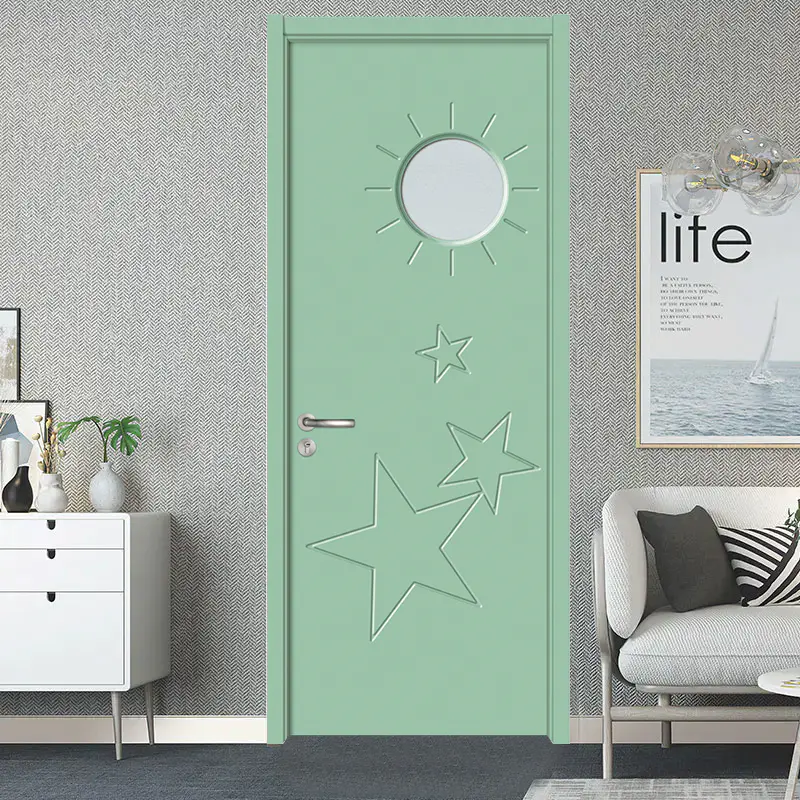Product Consultation
Your email address will not be published. Required fields are marked *

The thickness of the glass used in glass wooden doors plays a critical role in its impact resistance and overall durability. Thicker glass panels are generally more robust and able to withstand greater force without cracking or shattering. For standard residential applications, a typical thickness might range from 5mm to 10mm, which is adequate to handle everyday bumps or minor impacts. However, in high-traffic areas or commercial settings, thicker glass—often between 10mm and 15mm—may be recommended to ensure the door maintains its integrity even under higher stress levels. Thicker glass tends to provide better soundproofing, improving the overall performance of the door in terms of privacy and noise reduction. On the other hand, very thick glass may add weight to the door, which should be considered during design and installation to ensure that the door frame and hardware can adequately support the additional load.
Glass panels can be enhanced with various coatings and treatments to further improve their durability and impact resistance. One popular option is the application of safety films or protective coatings, which can be added to the surface of the glass. These films increase the glass's resistance to breakage by absorbing and dispersing the energy from impacts, thus preventing shards from scattering and providing added safety in case of accidents. UV-resistant coatings can be applied to reduce the degradation of both the glass and surrounding wooden frame when exposed to sunlight. These coatings prevent fading, discoloration, and potential weakening of the materials due to prolonged UV exposure. In more specialized applications, anti-scratch coatings can be used to maintain the clarity and integrity of the glass surface, while anti-fog coatings may be applied for aesthetic and functional benefits, particularly in humid environments.
The construction of the door frame and how the glass is secured within it plays a significant role in the overall durability of glass wooden doors. A well-constructed frame ensures that the glass is held securely and evenly, which helps to distribute any impact or pressure more effectively. Wooden frames typically offer a balance of strength and flexibility, which can absorb light to moderate impacts without causing the glass to break. However, the frame must be designed to support the weight of the glass, especially if thicker or laminated glass is used. In cases where additional strength is required, reinforced frames made from composite materials or steel inserts can be used to provide superior support. Proper sealing and insulation of the glass within the frame are equally important, as this prevents the glass from shifting over time and reduces the chances of cracks or stress points developing. The quality of the door’s construction, including the type of wood used, also impacts how well the door can resist environmental stressors such as humidity, temperature fluctuations, or physical impacts.
While glass wooden doors offer a modern, aesthetic appeal and a higher degree of light transmission compared to solid wood doors, they do remain more vulnerable to certain types of impacts. Glass, by nature, is more fragile than solid materials like wood or metal. However, advancements in glass technologies, such as the use of tempered or laminated glass, have significantly improved their resistance to typical household impacts. Tempered glass is designed to be several times stronger than regular glass and can absorb a considerable amount of impact before breaking. In the event of a breakage, it shatters into small, blunt pieces, reducing the risk of injury. Laminated glass, with its plastic interlayer, provides even more impact resistance and is often used in environments where safety and durability are paramount. While these types of glass are highly durable in day-to-day use, they may still be susceptible to significant impacts, such as from heavy objects or intentional force. As a result, glass wooden doors, while sturdy, should be handled with care, and extra protection, like glass films or safety nets, may be considered for areas with a higher likelihood of extreme impacts.
Proper maintenance and careful handling are essential in prolonging the life of glass wooden doors and ensuring their durability. Regular inspections of the glass panels for any chips, cracks, or signs of stress are necessary to catch potential problems early, before they develop into more significant issues. Preventive measures, such as cleaning the glass surface with non-abrasive materials, can help maintain its appearance and functionality. For example, harsh chemical cleaners or abrasive tools may scratch or damage the glass, compromising its resistance to future impacts.
Your email address will not be published. Required fields are marked *